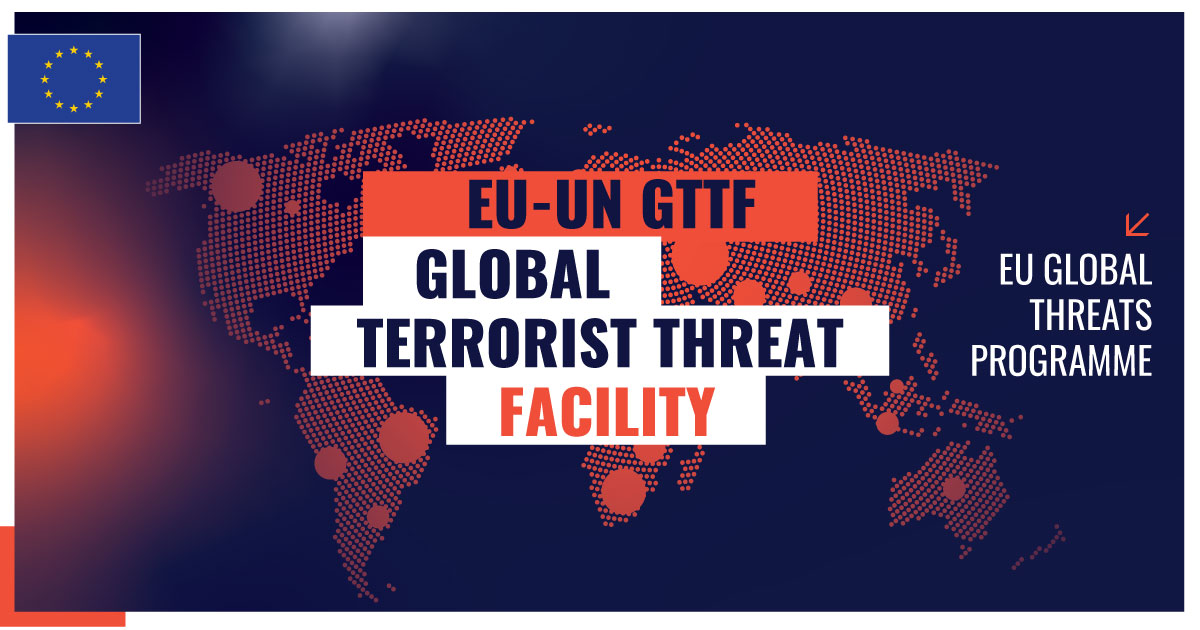
Context
The threat posed by terrorism to international peace and security is on the rise, notably in parts of Africa and Asia, as uncertainties around the situation in Afghanistan and the COVID-19 pandemic have exacerbated the vulnerabilities of UN Member States and affected their efforts to counter terrorism. The EU-UN Global Terrorism Threats Facility provides a framework for the rapid delivery of tailored technical assistance to help requesting countries build their capacity to effectively prevent and counter terrorism, while complying with international law. The Facility’s support centres around advisory and mentorship services, and can include also capacity-buildig actiivties and the provision of limited, light and non-lethal equipment.
Overall objective
This project aims to supportStates in enhancing their capacities to address the terrorist threat, disrupt terrorist networks, prevent and counter the activities of terrorists and bring them to justice in compliance with international law, human rights and the rule of law, and while advancing gender equality.
Specific objectives
- To enable Member States to receive rapid and tailored technical assistance to address their needs across the four pillars of the UN Global Counter-Terrorism Strategy and in line with UN Security Council requirements on counter-terrorism.
- To develop capacities to detect, prevent, counter, prosecute, investigate and respond to terrorism, including emerging terrorist modi operandi, while ensuring respect for international law, human rights and the rule of law, and advancing gender equality.
Concrete activities
The Facility delivers targeted technical assistance through tailored Support Packages (SPs), each addressing specific counter-terrorism needs of beneficiary units. By June 2025, 12 countries have requested support. Four SPs have been completed, nine are ongoing, and six are under development.
- Iraq: SP completed on technical assistance for voluntary repatriation processes from Al Hol camp in Northeast Syria; a second SP in development.
- Kenya: Two SPs ongoing on PCVE and OSINT with the National Counter-Terrorism Centre; a third SP in development for the Criminal Investigations Academy.
- Kyrgyzstan: SPs on digital forensics in CT cases and protection of vulnerable targets.
- Maldives: SP to enhance national capacity to investigate, prosecute and adjudicate terrorism-related cases.
- Malawi: SP to support drafting of a new anti-terrorism bill and improve interagency CT/PCVE coordination.
- Nigeria: SP pending approval on supporting the National Counter-Terrorism Centre to revise the national CT strategy and enhance threat analysis.
- Tajikistan: One completed SP and one pending approval on countering radiological/nuclear trafficking at the Afghan border.
- Togo: Ongoing SPs on the protection of vulnerable targets from terrorist attacks and countering the use of improvised explosive devices (IEDs) by terrorists.
- Uganda: Two SPs completed and one ongoing to strengthen investigation and prosecution of terrorism-related cases.
Results
- Kenya: Developed M&E framework for the revised PCVE strategy, a new approach to communication campaigns, and a five-year roadmap to enhance OSINT capacities.
- Kyrgyzstan: Strengthened Digital Forensics Laboratory through mentoring services, development of 20 new guidelines and 15 trainers certified in digital evidence collection.
- Iraq: Trained 43 national officers in trauma-informed interviewing techniques and data handling for repatriation processes from Northern Syria; provided IT equipment and database support.
- Malawi: Improved understanding of CT/PCVE coordination via study visits and benchmarking; supported public consultations and legal drafting through advice and logistics.
- Tajikistan: Trained 28 border officers in detecting nuclear and radiological threats; delivered vehicle and 30 radiation detectors to national CBRN agency.
- Togo: Developed protection and intervention plan for a vulnerable target with mentoring of eight officials from various agencies.
- Uganda: Enhanced police-prosecution coordination and compliance with fair trial standards through mentoring services and joint training of 28 trainers and domestic curriculum development.
Achievements
- Iraq: Immediate increase in the pace and improvement of the repatriation process, particularly with regard to human rights, gender issues and the protection of personal information.
- Kenya: Alignment of the NCTC’s role in strategic communications more closely with its coordination mandate.
- Kyrgyzstan: 30 per cent increase in the number of processed cases by the Digital Forensics Laboratory.
- Tajikistan: enhanced operational readiness of border guards and national CBRN agency at the border with Afghanistan.
- Uganda: higher acceptance rate of police files by prosecutors resulting in more cases being pleaded.
An independent mid-term evaluation of the Facility was commissioned by the United Nations Office of Counter-Terrorism and the findings will be available by September 2025 at https://www.un.org/counterterrorism/publications.
- Project duration
- 1 Nov 2021 - 1 Jun 2027
- Project locations
- IraqKenyaKyrgyzstanMaldivesMalawiMauritaniaNigeriaSomaliaTajikistanTogoUgandaUzbekistan
- Overall budget
- €13 693 754
- Threat area
- Counter-Terrorism, Prevention of Violent Extremism
